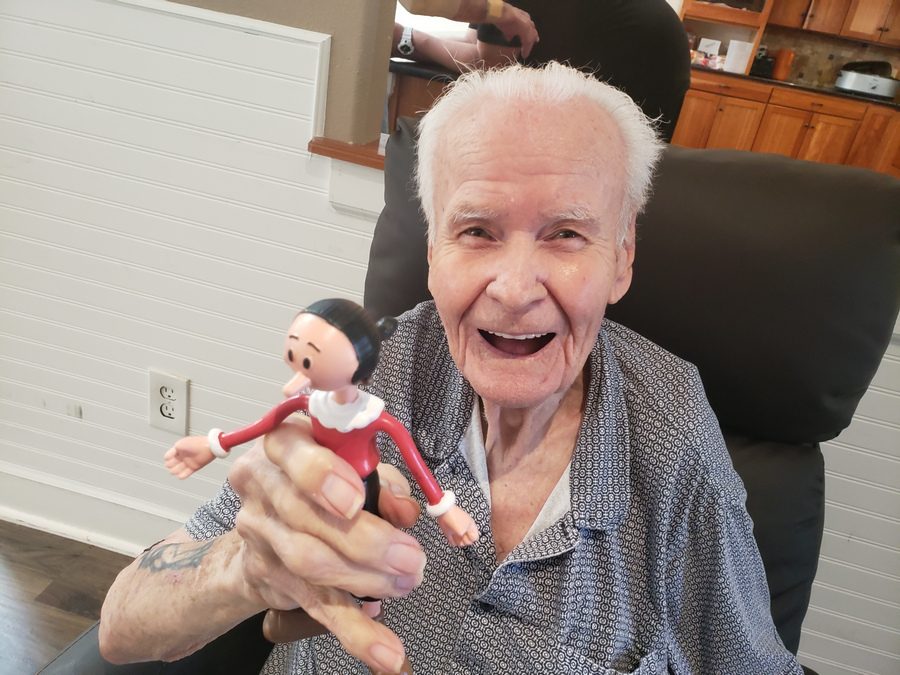Small Memory Carehomes Charlotte: A Compassionate Alternative
Small Memory Carehomes Charlotte: A Compassionate Alternative
Blog Article
Everything About Memory Treatment Providers: Why Tiny Memory Care Homes Are an Excellent Selection
Memory care services play an important role in sustaining people with Alzheimer's and dementia. Small memory treatment homes stick out for their personalized strategy and intimate setup. With reduced staff-to-resident proportions, these homes promote more powerful links and tailored treatment. Citizens gain from boosted social interactions and a safe setting. As family members discover options, recognizing the special benefits of tiny memory treatment homes comes to be vital. What aspects should be considered when choosing the ideal home?
Comprehending Memory Treatment Services
While numerous may know with general senior care choices, understanding memory treatment services is important for households encountering the obstacles of cognitive decrease. Memory care specifically provides to individuals with problems such as Alzheimer's illness and other kinds of dementia. These solutions give a structured atmosphere that concentrates on boosting the quality of life for citizens via specialized treatment and support.Memory care centers are created to assure safety and security and safety, commonly including protected settings to protect against roaming. Educated personnel are available all the time to assist with daily activities, medicine administration, and personal treatment. In addition, memory treatment programs typically consist of cognitive excitement tasks, tailored to involve residents and promote psychological health. Families can profit from understanding these solutions, as they make it possible for informed decisions concerning their enjoyed ones' care, ensuring that their particular needs and choices are attended to in a helpful and caring fashion.
The Advantages of Tiny Memory Treatment Residences
Small memory treatment homes use unique advantages that can substantially enhance the lifestyle for citizens with cognitive disabilities. One considerable advantage is the intimate setting, which permits personalized interactions amongst personnel and locals. This smaller setting fosters meaningful partnerships, minimizing feelings of seclusion and anxiety typically experienced by people with memory issues.Additionally, the lower staff-to-resident ratio in small memory treatment homes enables caretakers to supply more conscientious guidance and support. This method not just improves security but additionally promotes a complacency for the residents.Moreover, small memory treatment homes can adapt promptly to the special demands and choices of each local, enabling a more homelike atmosphere. Such an environment can urge social involvement and involvement in activities, inevitably enhancing the daily experiences of those living with cognitive impairments.
Personalized Care Program for Homeowners
Individualized treatment plans are essential in memory treatment homes, as they accommodate the unique needs and choices of each resident. These strategies begin with extensive evaluations performed by skilled experts, that examine cognitive capacities, medical history, and individual interests. This customized approach assurances that care is not just efficient but additionally considerate of each person's self-respect and autonomy.Moreover, individualized care plans are versatile, permitting adjustments as homeowners' requirements evolve in time. This versatility fosters a sense of protection and familiarity, which is vital for people dealing with memory difficulties. Caretakers are trained to carry out these strategies consistently, providing assistance that aligns with the homeowners' routines and preferences.Ultimately, personalized care plans improve the lifestyle for homeowners by advertising independence, engagement, and well-being, making them an essential facet of memory treatment services in little memory treatment homes.
Producing a Home-Like Environment
Creating a home-like setting is essential for cultivating convenience and familiarity in memory treatment settings, as it significantly influences locals' psychological wellness. Tiny memory care homes often focus on personalized touches, such as warm color combinations, family pictures, and familiar furniture arrangements, which aid homeowners really feel a lot more at simplicity. Integrating components reminiscent of a typical home, like comfortable living rooms and common locations, encourages a sense of belonging.Moreover, making use of all-natural light and outside areas can improve the ambience, promoting relaxation and harmony. Team member play a substantial role in preserving this atmosphere by involving with citizens in a compassionate way, treating them like family. Regular activities, such as cooking or gardening, can likewise add to a home-like feeling, using opportunities for homeowners to take part in meaningful experiences. Generally, producing a supporting setting supports cognitive function and emotional security, making it a crucial element of memory care services.
Improved Social Interaction and Area
Improved social communication and community are necessary parts of memory care services. By promoting individualized social interaction and producing a family-like atmosphere, these services advertise meaningful links amongst citizens. Group occasions and activities further encourage participation, helping people feel a lot more consisted of and sustained.
Customized Social Interaction
While social interaction is important for general wellness, lots of people with memory problems often battle to involve meaningfully with others. Customized social engagement in memory treatment homes addresses this obstacle by creating tailored activities that cater to locals' one-of-a-kind passions and capacities. By focusing on individual choices, caregivers can promote links that resonate deeply with each individual. Activities such as art treatment, music sessions, and assisted conversations promote cognitive excitement and emotional expression. Furthermore, little team setups urge friendship and permit more intimate interactions, improving feelings of belonging. This technique not only combats sensations of isolation but likewise empowers citizens to maintain a feeling of identity, eventually adding to improved psychological health and high quality of life.
Family-like Atmosphere
In a memory care setting, promoting a family-like atmosphere substantially improves social communication and builds a feeling of community among homeowners. Smaller memory treatment homes often prioritize intimate settings, permitting residents to create closer links with like this one an additional and personnel. This nurturing environment promotes trust fund, which is crucial for individuals with memory impairments. Citizens are most likely to talk and share experiences, developing a supportive network that reduces feelings of loneliness. The familiarity of common spaces and routines adds to a sense of belonging, even more motivating social communication (personalized memory care). In such settings, psychological bonds thrive, resulting in enhanced general health and a better of life for residents as they navigate their daily experiences together
Group Activities and Occasions

Safety and Protection Attributes in Small Homes
Lots of tiny homes developed for memory care incorporate vital safety and security and protection functions to assure the well-being of homeowners. These homes frequently use protected entry and leave indicate protect against straying, an usual issue among individuals with memory disabilities. In addition, surveillance systems and alarm devices boost surveillance, ensuring that team can immediately reply to any type of uncommon activities.Interior designs are tailored for safety, with minimized hazards such as clutter-free paths and sharp edges. Handrails and non-slip flooring are usually installed to minimize the risk of drops. Personnel are learnt emergency situation protocols, ensuring they are planned for different situations.Moreover, individualized treatment plans may include assessment of specific security needs, supplying tailored remedies for each and every resident. In general, these security and safety and security attributes produce a nurturing atmosphere where citizens can thrive while keeping their dignity and freedom.
Just how to Select the Right Memory Treatment Home
Just how can family members guarantee they pick one of the most ideal memory care home for their liked ones? The decision calls for cautious factor to consider of numerous elements. Households need to assess the center's staff credentials and training, ensuring that caretakers are experienced in handling memory-related conditions. Next, it's vital to evaluate the home's environment, focusing on security functions and whether it fosters a sense of area and belonging. Visiting the facility can offer insight right into day-to-day activities and the social environment, which are crucial for psychological excitement and emotional wellness. Additionally, families ought to ask about the care strategies provided, ensuring they are tailored to individual needs. Finally, taking into consideration the home's area and availability for family members brows through can add to a smoother change. By resolving these facets, families can make an educated decision that prioritizes their enjoyed one's comfort and lifestyle in a memory care setting.
Regularly Asked Inquiries
What Certifications Should Staff Members in Memory Care Houses Have?
Personnel members in memory care homes need to possess pertinent accreditations, experience in dementia treatment, solid interaction skills, and compassion. Continuous training in behavioral monitoring and restorative interventions improves their ability to sustain locals effectively.
Exactly How Do Memory Treatment Provider Differ From Conventional Assisted Living?
Memory care services focus particularly on individuals with memory disabilities, providing customized support and organized additional hints environments. On the other hand, conventional assisted living uses general support with daily activities, lacking the customized approach necessary for those with cognitive obstacles.
What Sorts of Tasks Are Offered in Memory Care Houses?
Memory treatment homes generally supply a variety of tasks designed to involve residents. Common choices include art therapy, songs sessions, cognitive video games, physical exercises, gardening, and gatherings, all aimed at enhancing health and cognitive feature.
Can Homeowners Bring Their Own Items to Memory Care Houses?
Citizens can commonly bring their very own items to memory care homes, discover here allowing them to personalize their space - personalized memory care. This technique aids create a familiar atmosphere, advertising comfort and a sense of identity for the individuals

Exactly How Are Relative Included in the Treatment Process?
Relative play an important function in the care procedure, frequently taking part in decision-making, participating in treatment meetings, and offering emotional support. Their involvement promotes a collective environment, boosting the citizen's general wellness and lifestyle. While lots of may be acquainted with basic elderly care choices, recognizing memory treatment services is essential for families encountering the difficulties of cognitive decline. These services give an organized atmosphere that focuses on enhancing the top quality of life for homeowners with specialized care and support.Memory care centers are developed to guarantee safety and protection, often including protected settings to stop straying. Personalized care plans are essential in memory care homes, as they provide to the unique requirements and choices of each homeowner. Personnel members in memory care homes should possess pertinent accreditations, experience in mental deterioration treatment, solid communication skills, and empathy. Memory care solutions focus specifically on individuals with memory disabilities, providing specialized support and structured atmospheres.
Report this page